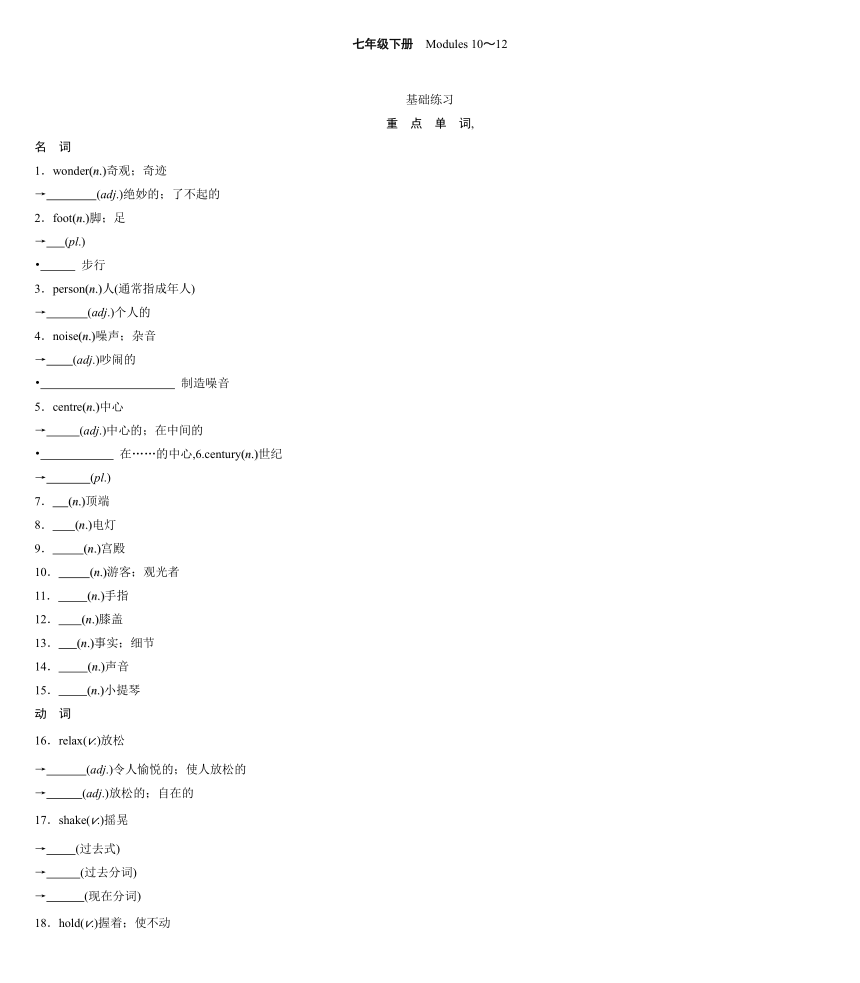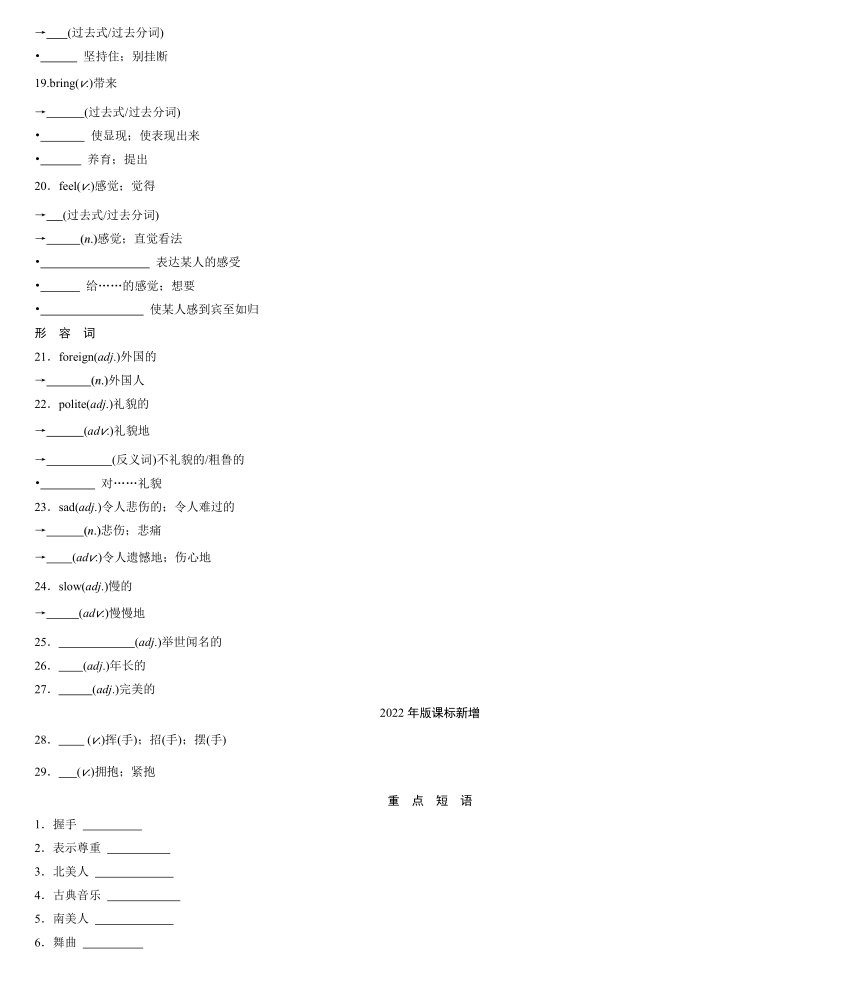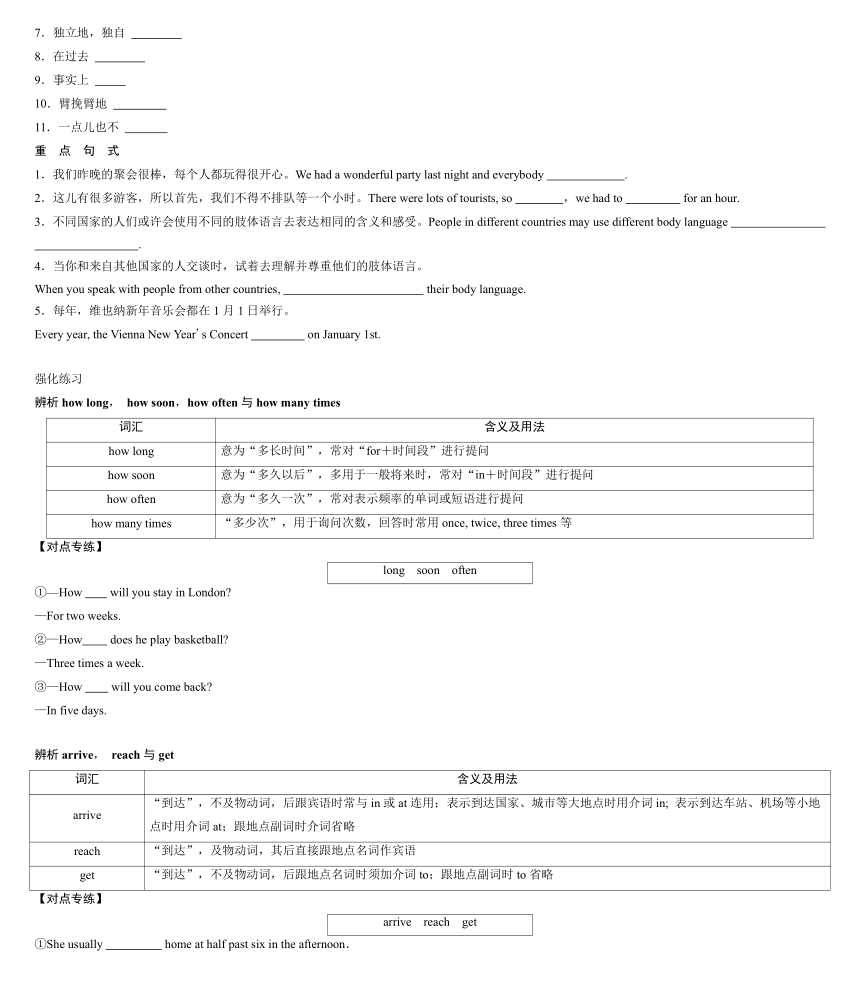2024年广西英语外研版中考总复习七年级下册Modules 10~12 课后练习(含答案)
文档属性
| 名称 | 2024年广西英语外研版中考总复习七年级下册Modules 10~12 课后练习(含答案) |

|
|
| 格式 | docx | ||
| 文件大小 | 28.6KB | ||
| 资源类型 | 教案 | ||
| 版本资源 | 外研版 | ||
| 科目 | 英语 | ||
| 更新时间 | 2024-05-21 00:00:00 | ||
图片预览



文档简介
七年级下册 Modules 10~12
基础练习
重 点 单 词,
名 词
1.wonder(n.)奇观;奇迹
→wonderful(adj.)绝妙的;了不起的
2.foot(n.)脚;足
→feet(pl.)
on foot 步行
3.person(n.)人(通常指成年人)
→personal(adj.)个人的
4.noise(n.)噪声;杂音
→noisy(adj.)吵闹的
make a noise/make noise(s) 制造噪音
5.centre(n.)中心
→central(adj.)中心的;在中间的
in the centre of 在……的中心,6.century(n.)世纪
→centuries(pl.)
7.top(n.)顶端
8.light(n.)电灯
9.palace(n.)宫殿
10.visitor(n.)游客;观光者
11.finger(n.)手指
12.knee(n.)膝盖
13.fact(n.)事实;细节
14.sound(n.)声音
15.violin(n.)小提琴
动 词
16.relax(v.)放松
→relaxing(adj.)令人愉悦的;使人放松的
→relaxed(adj.)放松的;自在的
17.shake(v.)摇晃
→shook(过去式)
→shaken(过去分词)
→shaking(现在分词)
18.hold(v.)握着;使不动
→held(过去式/过去分词)
hold on 坚持住;别挂断
19.bring(v.)带来
→brought(过去式/过去分词)
bring out 使显现;使表现出来
bring up 养育;提出
20.feel(v.)感觉;觉得
→felt(过去式/过去分词)
→feeling(n.)感觉;直觉看法
express one's feelings 表达某人的感受
feel like 给……的感觉;想要
make sb.feel at home 使某人感到宾至如归
形 容 词
21.foreign(adj.)外国的
→foreigner(n.)外国人
22.polite(adj.)礼貌的
→politely(adv.)礼貌地
→impolite/rude(反义词)不礼貌的/粗鲁的
be polite to 对……礼貌
23.sad(adj.)令人悲伤的;令人难过的
→sadness(n.)悲伤;悲痛
→sadly(adv.)令人遗憾地;伤心地
24.slow(adj.)慢的
→slowly(adv.)慢慢地
25.world-famous(adj.)举世闻名的
26.elder(adj.)年长的
27.perfect(adj.)完美的
2022年版课标新增
28.wave (v.)挥(手);招(手);摆(手)
29.hug(v.)拥抱;紧抱
重 点 短 语
1.握手 shake hands
2.表示尊重 show respect
3.北美人 North American
4.古典音乐 classical music
5.南美人 South American
6.舞曲 dance music
7.独立地,独自 by oneself
8.在过去 in the past
9.事实上 in fact
10.臂挽臂地 arm in arm
11.一点儿也不 not at all
重 点 句 式
1.我们昨晚的聚会很棒,每个人都玩得很开心。We had a wonderful party last night and everybody had a good time.
2.这儿有很多游客,所以首先,我们不得不排队等一个小时。There were lots of tourists, so first of all,we had to wait in line for an hour.
3.不同国家的人们或许会使用不同的肢体语言去表达相同的含义和感受。People in different countries may use different body language to express the same meaning and feelings.
4.当你和来自其他国家的人交谈时,试着去理解并尊重他们的肢体语言。
When you speak with people from other countries, try to understand and respect their body language.
5.每年,维也纳新年音乐会都在1月1日举行。
Every year, the Vienna New Year's Concert takes place on January 1st.
强化练习
辨析how long, how soon,how often与how many times
词汇 含义及用法
how long 意为“多长时间”,常对“for+时间段”进行提问
how soon 意为“多久以后”,多用于一般将来时,常对“in+时间段”进行提问
how often 意为“多久一次”,常对表示频率的单词或短语进行提问
how many times “多少次”,用于询问次数,回答时常用once, twice, three times等
【对点专练】
long soon often
①—How long will you stay in London
—For two weeks.
②—Howoften does he play basketball
—Three times a week.
③—How soon will you come back
—In five days.
辨析arrive, reach与get
词汇 含义及用法
arrive “到达”,不及物动词,后跟宾语时常与in或at连用;表示到达国家、城市等大地点时用介词in; 表示到达车站、机场等小地点时用介词at;跟地点副词时介词省略
reach “到达”,及物动词,其后直接跟地点名词作宾语
get “到达”,不及物动词,后跟地点名词时须加介词to;跟地点副词时to省略
【对点专练】
arrive reach get
①She usually gets/arrives home at half past six in the afternoon.
②The train arrived at the station 20 minutes late yesterday.
③They didn't reach Shanghai until after dark.
辨析both, neither, all与none
词汇 含义及用法
both 表示“(两者)都”,常用于“both ...and ...”结构中,意为“……和……都”;连接两个并列的主语时,谓语动词用复数
neither 表示“(两者)都不”,常用于“neither ...nor ...”结构中,意为“既不……,也不……”;连接两个主语时,谓语动词遵循“就近原则”
all 表示“(三者或三者以上)都”,作主语时谓语动词用复数
none 表示“(三者或三者以上)都不”,作主语时,谓语动词用单数
【对点专练】
both neither all none
①All of the students are ready for class.
②Both Lucy and Lily are good at singing.
③Four children were walking under a small umbrella, but none of them got wet.
④It's neither too hot nor too cold all around the year in Kunming.
语法练习
一般过去时的特殊疑问句
( C )1.(2023河北改编)— did you get the toy car
—From Betty.She made it herself.
A.How B.What
C.Where
感叹句(2019北部湾经济区39题)
( B )2.(2023滨州改编)— amazing ChatGPT is!
—Yes.The new invention makes it quite simple for people to write papers and stories.
A.What a
B.How
C.What
( C )3.(2023锦州改编)— good advice it is! I'm sure to have a wonderful summer vacation.
—I'm so glad that you like it.
A.How B.What a
C.What
祈使句(2021北部湾经济区36题)
( C )4.(2023江西改编)— quiet, please! Your sister is reading a book.
—All right! I will.
A.Being B.To be
C.Be
( A )5.(2023菏泽改编)— up! The bus is leaving soon.
—Don't worry.There is a little time left.
A.Hurry
B.To hurry
C.Hurrying
写出下列黑体单词的熟义,并根据语境选出最佳生义。
1.top
熟义:(n.)顶端
生义:A.(adj.)(位置、级别等)最高的
B.(n.)尽头;远端
( A )(1)He lives on the top floor.
( B )(2)I will meet you at the top of the street.
2.move
熟义:(v.)①搬家
②移动;改变……的位置
生义:A.(v.)前进;进步;进展
B.(v.)使感动;打动
( A )(1)Time is moving on.
( B )(2)We were deeply moved by her hard work.
3.poor
熟义:(adj.)贫穷的
生义:A.(adj.)可怜的
B.(adj.)不擅长的,不熟练的
( B )(1)She is a good teacher but a poor manager.
( A )(2)Lots of people get ready to help this poor boy and his mother.
4.sound
熟义:(n.)声音
(v.)听起来;令人觉得
生义:A.(adj.)完好的;健康的
B.(v.)发音
( A )(1)We arrived home safe and sound.
( B )(2)You don't sound the “h” in the word “hour”.
提能练习
一、根据语境或提示,完成句子。
1.Remember to turn off all the l ights before you leave.
2.People b ow to each other when they meet in Japan.
3.The mother kissed(亲吻) the baby on the face and went out.
4.Did you hear the s ound of the wind last night
5.You spend a lot of time on the exam and I b elieve you will pass it.
二、用括号内所给单词的适当形式填空。
1.My cousin became(become) a football player after he left school.
2.Look! Simply(simple) click on it, and you can learn about the history of the city.
3.Please stop talking(talk), boys.I have something important to tell you.
4.There are many children in the room.It's very noisy(noise) there.
5.My elder(old) sister is two years older than me.
三、小语篇特训。(教材链接:外研七下Module 11 Unit 2改编)
touch space hold polite way
Body language is useful around the world.Here are some 1.ways to welcome new foreign students.
It's OK to stand close to people in the Middle East, but give more personal 2.space to North Americans when you talk to them.
South Americans sometimes 3.hold your arm when they talk to you instead of arm in arm with their friends like Chinese girls.So you can't move away! But in Britain many people don't like other people to 4.touch them at all.
In some places, it isn't polite to look at people when you talk, but in other countries it is 5.impolite to look somewhere else.
Wave to say goodbye.But in Greece, it's very rude!
选词填空(2023眉山改编)
week also relax exercise if dish never time you have
Weekends give us an important break from the work days.How should you spend them to make yourself feel 1.relaxed? Here is some advice for you.
*Take time to 2.exercise.Exercising is a great way to relieve(缓解) stress after a long 3.week.You can go to the gym or play a sport to get 4.your body moving.
*Get outside.5.If the weather is nice, try to spend at least an hour walking around your neighbourhood or going to a nearby park.It's 6.never a good idea to stay at home all the time.
*Enjoy a great meal.You can go out to a restaurant to taste new 7.dishes or special drinks.You can 8.also have fun cooking at home.
*Meet friends and family.Weekends are great for spending 9.time with people you don't often get to see during the week.You can set up a game night for your family or 10.have a good time with your friends.
基础练习
重 点 单 词,
名 词
1.wonder(n.)奇观;奇迹
→wonderful(adj.)绝妙的;了不起的
2.foot(n.)脚;足
→feet(pl.)
on foot 步行
3.person(n.)人(通常指成年人)
→personal(adj.)个人的
4.noise(n.)噪声;杂音
→noisy(adj.)吵闹的
make a noise/make noise(s) 制造噪音
5.centre(n.)中心
→central(adj.)中心的;在中间的
in the centre of 在……的中心,6.century(n.)世纪
→centuries(pl.)
7.top(n.)顶端
8.light(n.)电灯
9.palace(n.)宫殿
10.visitor(n.)游客;观光者
11.finger(n.)手指
12.knee(n.)膝盖
13.fact(n.)事实;细节
14.sound(n.)声音
15.violin(n.)小提琴
动 词
16.relax(v.)放松
→relaxing(adj.)令人愉悦的;使人放松的
→relaxed(adj.)放松的;自在的
17.shake(v.)摇晃
→shook(过去式)
→shaken(过去分词)
→shaking(现在分词)
18.hold(v.)握着;使不动
→held(过去式/过去分词)
hold on 坚持住;别挂断
19.bring(v.)带来
→brought(过去式/过去分词)
bring out 使显现;使表现出来
bring up 养育;提出
20.feel(v.)感觉;觉得
→felt(过去式/过去分词)
→feeling(n.)感觉;直觉看法
express one's feelings 表达某人的感受
feel like 给……的感觉;想要
make sb.feel at home 使某人感到宾至如归
形 容 词
21.foreign(adj.)外国的
→foreigner(n.)外国人
22.polite(adj.)礼貌的
→politely(adv.)礼貌地
→impolite/rude(反义词)不礼貌的/粗鲁的
be polite to 对……礼貌
23.sad(adj.)令人悲伤的;令人难过的
→sadness(n.)悲伤;悲痛
→sadly(adv.)令人遗憾地;伤心地
24.slow(adj.)慢的
→slowly(adv.)慢慢地
25.world-famous(adj.)举世闻名的
26.elder(adj.)年长的
27.perfect(adj.)完美的
2022年版课标新增
28.wave (v.)挥(手);招(手);摆(手)
29.hug(v.)拥抱;紧抱
重 点 短 语
1.握手 shake hands
2.表示尊重 show respect
3.北美人 North American
4.古典音乐 classical music
5.南美人 South American
6.舞曲 dance music
7.独立地,独自 by oneself
8.在过去 in the past
9.事实上 in fact
10.臂挽臂地 arm in arm
11.一点儿也不 not at all
重 点 句 式
1.我们昨晚的聚会很棒,每个人都玩得很开心。We had a wonderful party last night and everybody had a good time.
2.这儿有很多游客,所以首先,我们不得不排队等一个小时。There were lots of tourists, so first of all,we had to wait in line for an hour.
3.不同国家的人们或许会使用不同的肢体语言去表达相同的含义和感受。People in different countries may use different body language to express the same meaning and feelings.
4.当你和来自其他国家的人交谈时,试着去理解并尊重他们的肢体语言。
When you speak with people from other countries, try to understand and respect their body language.
5.每年,维也纳新年音乐会都在1月1日举行。
Every year, the Vienna New Year's Concert takes place on January 1st.
强化练习
辨析how long, how soon,how often与how many times
词汇 含义及用法
how long 意为“多长时间”,常对“for+时间段”进行提问
how soon 意为“多久以后”,多用于一般将来时,常对“in+时间段”进行提问
how often 意为“多久一次”,常对表示频率的单词或短语进行提问
how many times “多少次”,用于询问次数,回答时常用once, twice, three times等
【对点专练】
long soon often
①—How long will you stay in London
—For two weeks.
②—Howoften does he play basketball
—Three times a week.
③—How soon will you come back
—In five days.
辨析arrive, reach与get
词汇 含义及用法
arrive “到达”,不及物动词,后跟宾语时常与in或at连用;表示到达国家、城市等大地点时用介词in; 表示到达车站、机场等小地点时用介词at;跟地点副词时介词省略
reach “到达”,及物动词,其后直接跟地点名词作宾语
get “到达”,不及物动词,后跟地点名词时须加介词to;跟地点副词时to省略
【对点专练】
arrive reach get
①She usually gets/arrives home at half past six in the afternoon.
②The train arrived at the station 20 minutes late yesterday.
③They didn't reach Shanghai until after dark.
辨析both, neither, all与none
词汇 含义及用法
both 表示“(两者)都”,常用于“both ...and ...”结构中,意为“……和……都”;连接两个并列的主语时,谓语动词用复数
neither 表示“(两者)都不”,常用于“neither ...nor ...”结构中,意为“既不……,也不……”;连接两个主语时,谓语动词遵循“就近原则”
all 表示“(三者或三者以上)都”,作主语时谓语动词用复数
none 表示“(三者或三者以上)都不”,作主语时,谓语动词用单数
【对点专练】
both neither all none
①All of the students are ready for class.
②Both Lucy and Lily are good at singing.
③Four children were walking under a small umbrella, but none of them got wet.
④It's neither too hot nor too cold all around the year in Kunming.
语法练习
一般过去时的特殊疑问句
( C )1.(2023河北改编)— did you get the toy car
—From Betty.She made it herself.
A.How B.What
C.Where
感叹句(2019北部湾经济区39题)
( B )2.(2023滨州改编)— amazing ChatGPT is!
—Yes.The new invention makes it quite simple for people to write papers and stories.
A.What a
B.How
C.What
( C )3.(2023锦州改编)— good advice it is! I'm sure to have a wonderful summer vacation.
—I'm so glad that you like it.
A.How B.What a
C.What
祈使句(2021北部湾经济区36题)
( C )4.(2023江西改编)— quiet, please! Your sister is reading a book.
—All right! I will.
A.Being B.To be
C.Be
( A )5.(2023菏泽改编)— up! The bus is leaving soon.
—Don't worry.There is a little time left.
A.Hurry
B.To hurry
C.Hurrying
写出下列黑体单词的熟义,并根据语境选出最佳生义。
1.top
熟义:(n.)顶端
生义:A.(adj.)(位置、级别等)最高的
B.(n.)尽头;远端
( A )(1)He lives on the top floor.
( B )(2)I will meet you at the top of the street.
2.move
熟义:(v.)①搬家
②移动;改变……的位置
生义:A.(v.)前进;进步;进展
B.(v.)使感动;打动
( A )(1)Time is moving on.
( B )(2)We were deeply moved by her hard work.
3.poor
熟义:(adj.)贫穷的
生义:A.(adj.)可怜的
B.(adj.)不擅长的,不熟练的
( B )(1)She is a good teacher but a poor manager.
( A )(2)Lots of people get ready to help this poor boy and his mother.
4.sound
熟义:(n.)声音
(v.)听起来;令人觉得
生义:A.(adj.)完好的;健康的
B.(v.)发音
( A )(1)We arrived home safe and sound.
( B )(2)You don't sound the “h” in the word “hour”.
提能练习
一、根据语境或提示,完成句子。
1.Remember to turn off all the l ights before you leave.
2.People b ow to each other when they meet in Japan.
3.The mother kissed(亲吻) the baby on the face and went out.
4.Did you hear the s ound of the wind last night
5.You spend a lot of time on the exam and I b elieve you will pass it.
二、用括号内所给单词的适当形式填空。
1.My cousin became(become) a football player after he left school.
2.Look! Simply(simple) click on it, and you can learn about the history of the city.
3.Please stop talking(talk), boys.I have something important to tell you.
4.There are many children in the room.It's very noisy(noise) there.
5.My elder(old) sister is two years older than me.
三、小语篇特训。(教材链接:外研七下Module 11 Unit 2改编)
touch space hold polite way
Body language is useful around the world.Here are some 1.ways to welcome new foreign students.
It's OK to stand close to people in the Middle East, but give more personal 2.space to North Americans when you talk to them.
South Americans sometimes 3.hold your arm when they talk to you instead of arm in arm with their friends like Chinese girls.So you can't move away! But in Britain many people don't like other people to 4.touch them at all.
In some places, it isn't polite to look at people when you talk, but in other countries it is 5.impolite to look somewhere else.
Wave to say goodbye.But in Greece, it's very rude!
选词填空(2023眉山改编)
week also relax exercise if dish never time you have
Weekends give us an important break from the work days.How should you spend them to make yourself feel 1.relaxed? Here is some advice for you.
*Take time to 2.exercise.Exercising is a great way to relieve(缓解) stress after a long 3.week.You can go to the gym or play a sport to get 4.your body moving.
*Get outside.5.If the weather is nice, try to spend at least an hour walking around your neighbourhood or going to a nearby park.It's 6.never a good idea to stay at home all the time.
*Enjoy a great meal.You can go out to a restaurant to taste new 7.dishes or special drinks.You can 8.also have fun cooking at home.
*Meet friends and family.Weekends are great for spending 9.time with people you don't often get to see during the week.You can set up a game night for your family or 10.have a good time with your friends.
同课章节目录
